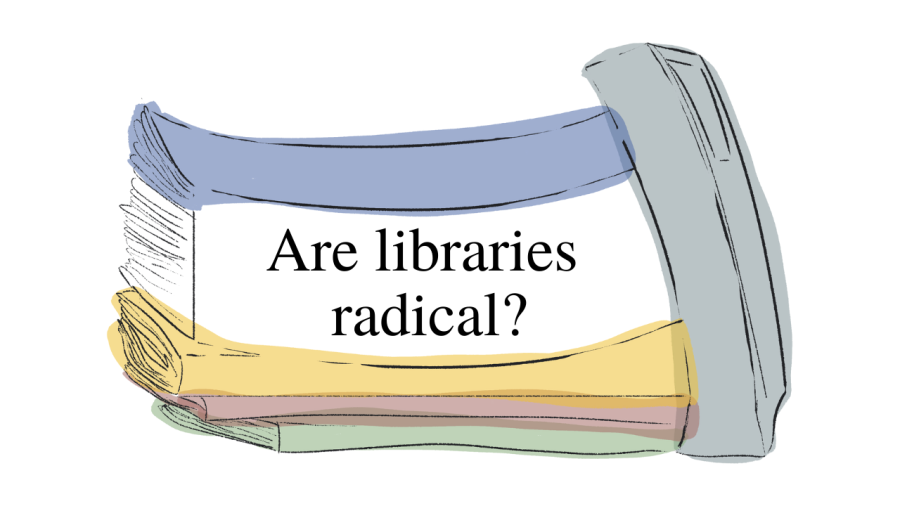Public libraries are an invaluable part of our communities, and the free access to resources definitely stands out in our capitalist society that primarily prioritizes profit over accessibility. But is that enough to make them radical?
Recent attempts to provide widespread access to resources in the U.S., like universal healthcare or universal child care, have faced strong opposition. Libraries are a long-standing institution in our society, but today, their expansive, free resources that we take for granted could be seen as radically progressive.
Susan Burgess is a professional lecturer in political science at DePaul and the author of a book on radical politics.
In the context of the U.S., Burgess said “something is radical, or a form of radical politics, when it runs against the grain or challenges very basic tenets of American democracy.”
The first free public library opened in 1833, when a municipality in New Hampshire set out to create an institution the whole community would have access to, according to the American Library Association (ALA).
Burgess does not believe the idea of public libraries is radical because they are such a longstanding example of a public good. She argues there are several other examples of these kinds of institutions as well, such as public universities and public parks.
“The only way you could think of it as radical is if there’s no such thing as a public good — a shared good that society decides that it wants to have and to foster,” Burgess said.
Challenging that idea, the ALA displays a quote by a man named Matt Finch above their website’s section on information access and equity:
“Libraries are innately subversive institutions born of the radical notion that every single member of society deserves free, high-quality access to knowledge and culture.”
The idea of a public good isn’t new or radical, but how common is it? Where else besides public libraries can you find such a range of services and with real people to assist in accessing them for free?
Many libraries have even ended fines for late returns, which the Chicago Public Library (CPL) did back in 2019. They are an institution devoted to generosity, contrasting heavily with the rest of our exchange-based society.
Offering so much more than just books, the CPL hosts mock interviews, college financial aid workshops and informational sessions on how to obtain a Green Card. They also have a variety of programming for kids of all ages, from storybook readings for younger children to yoga classes and DSLR camera workshops for teens.
“[Library programming is] an open invitation for anybody in the community to join,” said Ashley McMullin, the associate university librarian for teaching, research and engagement at DePaul.
McMullin said she even knows a few libraries that have begun offering things like gardening tools and baking supplies for their patrons to use.
“Anybody should be able to make, or do, or create [what they’d like,]” McMullin said. “If it’s access to something that’s making it so you can’t do that, that’s where libraries are trying to step in and change the whole dynamic of who can and can’t do things.”
Here at DePaul, librarians are working to make academic materials that normally appear behind a paywall more accessible, like scanning and uploading material to course reserves to avoid requiring costly textbooks for class.
They’re also encouraging professors to publish their research in open access journals, and partnering with faculty on developing open educational resources, like textbooks written to be freely shared with other institutions and posted online at no cost.
“I think that’s part of where we’re doing radical work.” McMullin said.
And libraries’ most important resource — free and open information — is becoming if not more radical, then at least more vital. Hundreds of books are challenged to be censored from schools and libraries each year, as reported on the ALA website.
In addition to banned books, as more states introduce legislation to restrict topics like racism, gender and sexuality in schools, the freedom of information that libraries offer is becoming increasingly important.
To help combat this, DePaul’s own library holds events for “Banned Book Week” every year. They encourage students to read and understand the books’ controversial content for themselves, even bringing in a theater group to read from some of their pages.
If libraries previously did not exist and the concept was only introduced now, would we be able to recreate such an institution? Or would a place that’s so freely accessible seem as radical as legislation like universal health care?
“Can you be radical and be a public good at the same time?” McMullin said. “To me, I think you can.”
The idea of libraries — of free resources, a space for community and the idea of a public good — should not be radical. It should be a core value in our society. But often, it seems that values like community and generosity are few and far to come by. We shouldn’t take libraries for granted, and instead look to them as models to strengthen our communities and to better our democracy.




buytwitchviewers.com / Mar 16, 2022 at 2:12 am
Libraries are not radical. They are a place for people to come together and learn about the world. Libraries provide a space for people to come together and learn about the world. They provide a space for people to come together and learn about the world.
Monroe B. Baker / Mar 8, 2022 at 3:25 pm
I agree with you and nowadays it is the important part. I remember one history from my university age. I have a part-time job and I don`t have free time. One day I should solve my problem with an essay and I found a course https://writemypapers.company/coursework-writing-service/ that solves my problem. I read a course and order several essays that check and I was really happy that it is working.